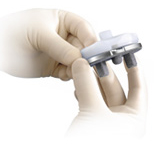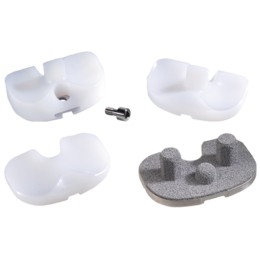Product Description
 The Trabecular Metal Tibial Tray unites stable fixation with modular components to meet a growing demand for knees implanted through mini-arthrotomies. With mechanical properties similar to cancellous bone, Trabecular Metal Technology is designed to achieve stable initial fixation. The separate articulating surface is available in Prolong® Highly Crosslinked Polyethylene, which is specifically designed to reduce wear and delamination.* And the modular components work with the Zimmer® Minimally Invasive Solutions™ procedures.
The Trabecular Metal Tibial Tray unites stable fixation with modular components to meet a growing demand for knees implanted through mini-arthrotomies. With mechanical properties similar to cancellous bone, Trabecular Metal Technology is designed to achieve stable initial fixation. The separate articulating surface is available in Prolong® Highly Crosslinked Polyethylene, which is specifically designed to reduce wear and delamination.* And the modular components work with the Zimmer® Minimally Invasive Solutions™ procedures.
*The results of in vitro wear and delamination tests have not been shown to correlate with clinical wear and delamination mechanisms.
Product Brochure
Indications
This device is indicated for patients with severe knee pain and disability due to:
- Collagen disorders, and/or avascular necrosis of the femoral condyle
- Post-traumatic loss of joint configuration, particularly when there is patellofemoral erosion, dysfunction or prior patellectomy
- Moderate valgus, varus, or flexion deformities
- The salvage of previously failed surgical attempts or for a knee in which satisfactory stability in flexion cannot be obtained at the time of surgery
Individualization of Treatment
Check the appropriate knee implant size-matching chart for component matching instructions. Mismatching may result in poor surface contact and could produce pain, decrease wear resistance, produce instability of the implant, or otherwise reduce implant life.
Use only instruments and provisionals specifically designed for use with these devices to help ensure accurate surgical implantation, soft-tissue balancing, and evaluation of knee function.
Contraindications
Contraindications include:
- Previous history of infection in the affected joint and/or local/systemic infection that may affect the prosthetic joint
- Insufficient bone stock on the tibial surface
- Skeletal immaturity
- Neuropathic arthropathy
- Osteoporosis or any loss of musculature or neuromuscular disease that compromises the affected limb
- A stable, painless arthrodesis in a satisfactory functional position
- Severe instability secondary to the absence of collateral ligament integrity






